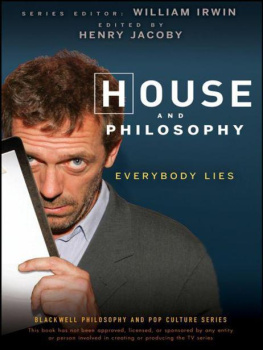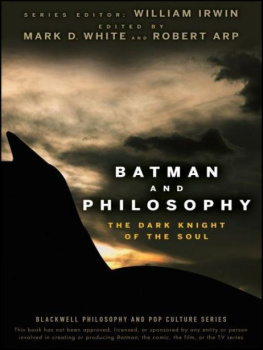Table of Contents
The Blackwell Philosophy and Pop Culture Series
Series Editor: William Irwin
South Park and Philosophy
Edited by Robert Arp
Metallica and Philosophy
Edited by William Irwin
Family Guy and Philosophy
Edited by J. Jeremy Wisnewski
The Daily Show and Philosophy
Edited by Jason Holt
Lost and Philosophy
Edited by Sharon Kaye
24 and Philosophy
Edited by Richard Davis, Jennifer Hart Week,
and Ronald Weed
Battlestar Galactica and Philosophy
Edited by Jason T. Eberl
The Office and Philosophy
Edited by J. Jeremy Wisnewski
Batman and Philosophy
Edited by Mark D. White and Robert Arp
Heroes and Philosophy
Edited by David Kyle Johnson

Copyright 2009 by John Wiley & Sons, Inc. All rights reserved
Published by John Wiley & Sons, Inc., Hoboken, New Jersey
Published simultaneously in Canada
No part of this publication may be reproduced, stored in a retrieval system, or transmitted in any form or by any means, electronic, mechanical, photocopying, recording, scanning, or otherwise, except as permitted under Section 107 or 108 of the 1976 United States Copyright Act, without either the prior written permission of the Publisher, or authorization through payment of the appropriate per-copy fee to the Copyright Clearance Center, 222 Rosewood Drive, Danvers, MA 01923, (978) 750-8400, fax (978) 646-8600, or on the web at www.copyright.com . Requests to the Publisher for permission should be addressed to the Permissions Department, John Wiley & Sons, Inc., 111 River Street, Hoboken, NJ 07030, (201) 748-6011, fax (201) 748-6008, or online at http://www.wiley.com/go/permissions .
Limit of Liability/Disclaimer of Warranty: While the publisher and the author have used their best efforts in preparing this book, they make no representations or warranties with respect to the accuracy or completeness of the contents of this book and specifically disclaim any implied warranties of merchantability or fitness for a particular purpose. No warranty may be created or extended by sales representatives or written sales materials. The advice and strategies contained herein may not be suitable for your situation. You should consult with a professional where appropriate. Neither the publisher nor the author shall be liable for any loss of profit or any other commercial damages, including but not limited to special, incidental, consequential, or other damages.
For general information about our other products and services, please contact our Customer Care Department within the United States at (800) 762-2974, outside the United States at (317) 572-3993 or fax (317) 572-4002.
Wiley also publishes its books in a variety of electronic formats. Some content that appears in print may not be available in electronic books. For more information about Wiley products, visit our web site at www.wiley.com .
Library of Congress Cataloging-in-Publication Data:
House and philosophy : everybody lies / edited by Henry Jacoby.
p. cm.(The Blackwell philosophy and pop culture
series)
Includes index.
eISBN : 978-0-470-73020-1
1. House, M. D. I. Jacoby, Henry.
PN1992.77.H63H65 2008
791.4572dc22
2008016842
ACKNOWLEDGMENTS
What? You Want Me to Thank You?
First, I want to thank Bill Irwin for giving me the opportunity to work on this book. I couldnt have done it without his guidance, patient help, and consistent sage advice. Bill, youre truly one of the good guys, and it has been a pleasure to work with you.
Thanks to Jeff Dean, who first got things rolling. Since then, Connie Santisteban and all the nice people at Wiley have been great to work with. Thanks for all your help and support throughout this project.
Im grateful to my fellow philosophers who contributed their wonderful essays. Your good work made my job easy.
My great friend and fellow guitar god Alan Berman actually read what I wrote and made creative suggestions. Not only that, he was always there when needed.
Without the talented people who work on House , there, of course, would be no book to write. Thanks for your brilliant hour of intelligent entertainment each week.
At home, my two cats, Bunkai and Willow, helped a lot, mostly by sleeping so I could work. They also took turns sitting with me when I needed inspiration. They are true Zen Masters.
Finally, theres my wife, Kathryn. Sweeter than Cameron, more patient than Wilson. And she helps with the typing. I cant do any of it without you.
INTRODUCTION
Read Less, More TV: A Cranky, Slightly Rude Introduction
Henry Jacoby
Dr. Gregory House, that brilliant pill-popping bastard, limps along the halls of Princeton-Plainsboro Teaching Hospital, knocking aside medical ethics with a wave of his cane. He tells us that everybody lies, that humanity is overrated, and that its the nature of medicine that youre going to screw up. And one more thing: Read less, more TV! Yeah, House says that, too. But he wasnt talking about this book . You really should read this book, the one youre now holding in your hands. House would want you to.
But why should we listen to him? Isnt he a jerk? Well, yes, but unlike the guy standing next to you reading the book on intelligent design, House is cool. House plays a mean guitar and a killer piano, and chicks think hes sexy (its the blue eyes). He even had a pet rat named Steve McQueenhow cool is that? And one more thing: hes brilliant. So who cares if he thinks that seizures are fun to watch but boring to diagnose? Whats not to love?
I love House, and so do the contributors to this volume. Humanity may in fact be overrated, but not this bunch! I never once thought about firing them all and holding auditions for a new team. But more on them in a minute (they can wait, just like the clinic patients House ignores). Lets get back to the Whats not to love? question.
Have I forgotten about the rudeness and the way House ridicules everyone elses ideas? (I tried that, by the way. I thought maybe Id be branded an eccentric genius and be paid accordingly. It didnt work.) Have I forgotten that hes a drug addict? Have I forgotten that he once asked if it was still illegal to perform an autopsy on a living person? No, I havent forgotten these things, but remember, he also saves lives. As Dr. Cuddy pointed out to that nasty Tritter fellow, he saves a lot more lives than he loses.
Like Socrates and Sherlock Holmes, House is intrigued by puzzles. His stubborn, relentless desire for the truth combined with his extraordinary reasoning skills means that the puzzles get solved, while the lives get saved. Hospital rules be damned!
Speaking of reasoning and truth, House has a lot to say about philosophy as well. And isnt it time that I got around to the philosophy part of House and Philosophy anyway? For House, Occams Razor holds that the simplest explanation is that almost always somebody screwed up. How about reality? Philosophers argue a lot about that. House says that reality is almost always wrong. And the Socratic method! He loves that. He says its the best way we have of teaching everything apart from juggling chainsaws.
The contributors to this volume (its time to talk about them; theyre not clinic patients, after all), just like Houses team, are first-rate. They expertly expand on Houses insights and examine his character. Its all in this book: Sartre and Nietzsche, Socrates and Aristotle, logic and luck, love and friendship, and even Zen. Some of it is pretty weird, really, but I like it. As House says, weird works for me. Now, bring me the thong of Lisa Cuddy!
Next page





